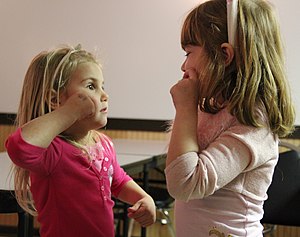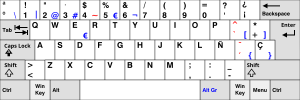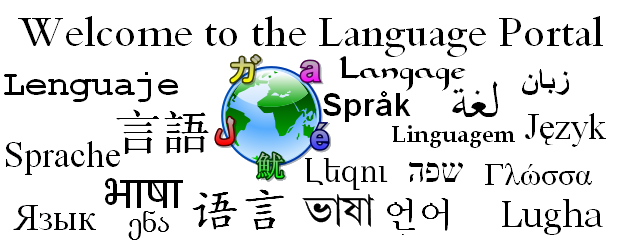Portal:Language




Language is a structured system of communication that consists of grammar and vocabulary. It is the primary means by which humans convey meaning, both in spoken and written forms, and may also be conveyed through sign languages. Human language is characterized by its cultural and historical diversity, with significant variations observed between cultures and across time. Human languages possess the properties of productivity and displacement, which enable the creation of an infinite number of sentences, and the ability to refer to objects, events, and ideas that are not immediately present in the discourse. The use of human language relies on social convention and is acquired through learning.
Estimates of the number of human languages in the world vary between 5,000 and 7,000. Precise estimates depend on an arbitrary distinction (dichotomy) established between languages and dialects. Natural languages are spoken, signed, or both; however, any language can be encoded into secondary media using auditory, visual, or tactile stimuli – for example, writing, whistling, signing, or braille. In other words, human language is modality-independent, but written or signed language is the way to inscribe or encode the natural human speech or gestures.
Depending on philosophical perspectives regarding the definition of language and meaning, when used as a general concept, "language" may refer to the cognitive ability to learn and use systems of complex communication, or to describe the set of rules that makes up these systems, or the set of utterances that can be produced from those rules. All languages rely on the process of semiosis to relate signs to particular meanings. Oral, manual and tactile languages contain a phonological system that governs how symbols are used to form sequences known as words or morphemes, and a syntactic system that governs how words and morphemes are combined to form phrases and utterances.
The scientific study of language is called linguistics. Critical examinations of languages, such as philosophy of language, the relationships between language and thought, how words represent experience, etc., have been debated at least since Gorgias and Plato in ancient Greek civilization. Thinkers such as Jean-Jacques Rousseau (1712–1778) have argued that language originated from emotions, while others like Immanuel Kant (1724–1804) have argued that languages originated from rational and logical thought. Twentieth century philosophers such as Ludwig Wittgenstein (1889–1951) argued that philosophy is really the study of language itself. Major figures in contemporary linguistics of these times include Ferdinand de Saussure and Noam Chomsky. (Full article...)

Sumerian (Sumerian: 𒅴𒂠, romanized: Emeg̃ir, lit. ''native language'') was the language of ancient Sumer. It is one of the oldest attested languages, dating back to at least 2900 BC. It is accepted to be a local language isolate and to have been spoken in ancient Mesopotamia, in the area that is modern-day Iraq.
Akkadian, a Semitic language, gradually replaced Sumerian as the primary spoken language in the area c. 2000 BC (the exact date is debated), but Sumerian continued to be used as a sacred, ceremonial, literary and scientific language in Akkadian-speaking Mesopotamian states such as Assyria and Babylonia until the 1st century AD. Thereafter, it seems to have fallen into obscurity until the 19th century, when Assyriologists began deciphering the cuneiform inscriptions and excavated tablets that had been left by its speakers. (Full article...)
- ... that when American-born skier Katie Vesterstein chose to compete for Estonia, she had only visited the country once, and did not speak the language?
- ... that Theodolinda Hahnsson is the first known Finnish-language female author?
- ... that critics complained about the manga Sex Ed 120% being given a "mature" rating by its English-language publisher?
- ... that the seven leaders of the East Turkestan Revolutionary Party had Uyghur-language code names, the initials of which spelled out the word Lëninchi, meaning "Leninist"?
- ... that Ita Ekpenyon coached American actor Paul Robeson in speaking the Efik language for the 1937 film King Solomon's Mines?
- ... that the Brazilian social media page Tupinizando is dedicated to the promotion of Old Tupi, a dead language?
- ...that the Permanent North American Gaeltacht (pictured) is an officially designated Irish speaking area in English/French speaking Ontario, Canada, the first of its kind outside of Ireland?
- ...that Englog is English mixed with Tagalog words, while Taglish is Tagalog mixed with English words, both being macaronic languages?
- ...that some 19th-century newspapers in South Australia published articles in the Cornish dialect of English to meet the needs of miners who had migrated there?
- ...that the Halegannada, literally "old Kannada", is an ancient form of the Kannada language?
Linguistics: Computational linguistics • Grammar • Historical linguistics • Morphology • Phonetics • Phonology • Pragmatics • Reading • Semantics • Sociolinguistics • Syntax • Writing
Languages: Language families • Pidgins and creoles • Sign languages
Linguists: By nationality • Historical linguists • Morphologists • Phoneticians • Phonologists • Sociolinguists • Syntacticians • Translators
Stubs: Constructed languages • Languages • Linguists • Pidgins and creoles • Typography • Vocabulary and usage • Writing systems
Full Language category tree
|
|---|
|
Select [►] to view subcategories
|

There are four languages with official status in Catalonia (an autonomous community of Spain): Catalan; Spanish, which is official throughout Spain; Aranese, a dialect of Occitan spoken in the Aran Valley; and Catalan Sign Language. Many other languages are spoken in Catalonia as a result of recent immigration from all over the world.
Catalan has enjoyed special status since the approval of the Statute of Autonomy of 1979 which declares it to be the language "proper to Catalonia". Spanish had been the only official language for most of the period between the 18th century and 1975. (Full article...)
Geographical distribution of the preferential use of the terms castellano (Castilian), in red, vs. español (Spanish), in blue, to refer to the Spanish language
- 25 April 2024 – International reactions to the Israel–Hamas war
- The Arabic language spokesperson of the United States Department of State resigns in opposition to U.S. Gaza policy. (Reuters)
- 1 January 2024 – Public Domain Day
- The animated short film Steamboat Willie, the German-language version of the novel All Quiet on the Western Front, and other works published in 1928 enter the public domain in the United States. (Mashable)

Languages of Africa: Arabic, Chadic, Cushitic, Kanuri, Maasai, Setswana, Swahili, Turkana, Xhosa, Yoruba, Zulu, more...
Languages of the Americas: Aleut, Carib, Cherokee, Inuktitut, Iroquois, Kootenai, Mayan, Nahuatl, Navajo, Quechuan, Salish, American Sign Language, more...
Languages of Asia: Arabic, Assamese, Balochi, Bengali, Chinese, Japanese, Hajong, Hebrew, Hindustani, Kannada, Kokborok, Marathi, Khasi, Korean, Kurdish, Malayalam, Manipuri, Meithei, Mongolian, Persian, Rajasthani, Sindhi, Sanskrit, Sylheti, Tamil, Tanchangya, Tulu, Telugu, Tibetan, Thai, Turkish, Vietnamese, Khowar, more...
Languages of Austronesia: Austric, Fijian, Hawaiian, Javanese, Malagasy, Malay, Maori, Marshallese, Samoan, Tahitian, Tagalog, Tongan, Auslan, more...
Languages of Europe: Basque, Czech, Danish, Dutch, English (book), French, German, Greek, Italian, Latin, Leonese, Norwegian, Polish, Portuguese, Romanian, Russian, Slovak, Spanish, Ukrainian more...
Constructed languages: Esperanto, Ido, Volapük, more...
Agglutinative language, Analytic language, Constructed language, Creole, Context-free language, Extinct language, Dialect, Fusional language, Inflectional language, International language, Isolating language, Language isolate, National language, Natural language, Pidgin, Pluricentric language, Polysynthetic language, Proto-language, Sign language, Spoken language, Synthetic language, Variety (linguistics)

Applied linguistics, Cognitive linguistics, Accent (dialect), Computational linguistics, Descriptive linguistics, Eurolinguistics, Generative linguistics, Historical linguistics, Lexicology, Lexical semantics, Morphology, Onomasiology, Phonetics, Phonology, Pragmatics, Prescription, Prototype semantics, Psycholinguistics, Semantics, Stylistics, Sociolinguistics, Syntax
See also: List of linguists

Alphabets: Arabic alphabet, Bengali alphabet, Cyrillic alphabet, Hebrew alphabet, Latin alphabet, more...
Other writing systems: Abjad, Abugida, Braille, Hieroglyphics, Logogram, Syllabary, SignWriting, more..
See also: History of the alphabet, Script
The following Wikimedia Foundation sister projects provide more on this subject:
-
Commons
Free media repository -
Wikibooks
Free textbooks and manuals -
Wikidata
Free knowledge base -
Wikinews
Free-content news -
Wikiquote
Collection of quotations -
Wikisource
Free-content library -
Wikiversity
Free learning tools -
Wiktionary
Dictionary and thesaurus
| Enter an ISO 639 code to find the corresponding language article |





















